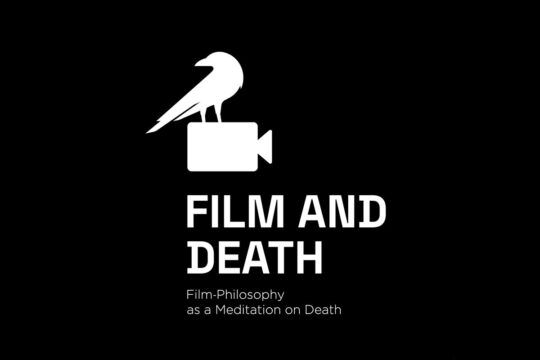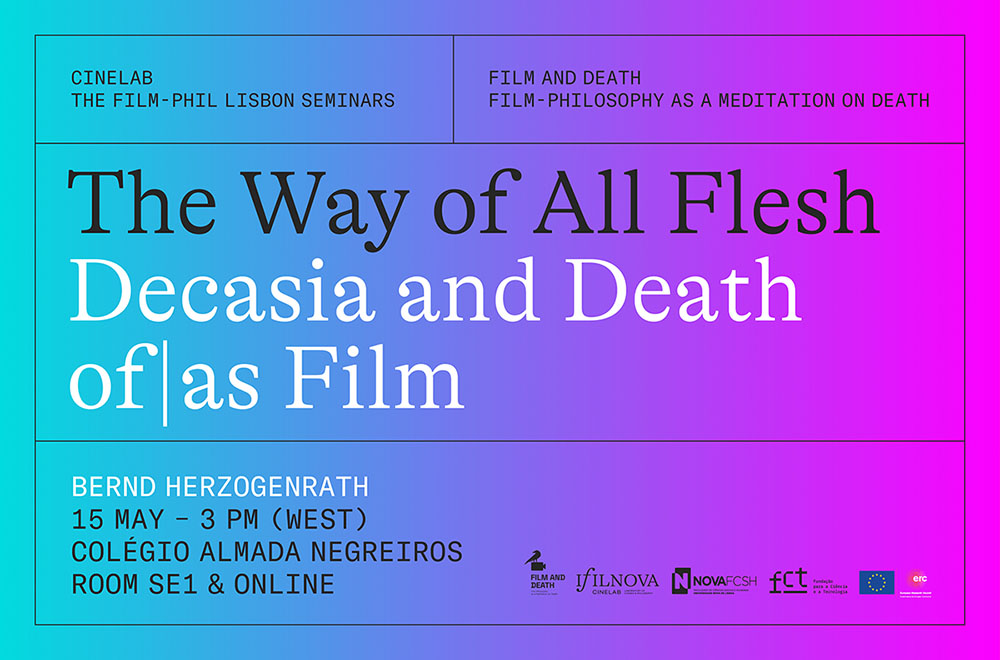
The Film-Phil Lisbon Seminars: Bernd Herzogenrath
Em maio, o seminário Film-Phil de Lisboa (2023-2024) estará a cargo de Bernd Herzogenrath (Goethe University of Frankfurt, Alemanha), que falará sobre “The Way of All Flesh: Decasia and Death of|as Film”. A sessão será em inglês e terá lugar no dia 15 de maio às 15h00 (hora de Lisboa), na sala SE1 do Colégio Almada Negreiros e online, via Zoom.
A série de seminários faz parte do projeto ERC “CINEMA E MORTE — A Filosofia do Cinema como uma Meditação sobre a Morte” (IFILNOVA). O seminário será híbrido, mas o pré-registo é obrigatório para participar online. Por favor, registe-se aqui.
O evento tem lugar no Colégio Almada Negreiros, Sala SE1 & Online.
Abstract
Bill Morrison’s ‘Decasia’ has death and decay already in its title. This talk focuses on the nexus of film, death, and materiality. Film is by default seen as a representation of time and its passing – ‘Decasia’ goes a decisive step further by focusing on the temporality of|in the filmic material. The medium ‘film’ seems most fitting to test such an of Material Culture and Media Studies, since film has entertained a most complex relation to time and death from its early beginnings onward: film promised to [re]present temporal dynamics – and the temporality of things – directly, unmediated, a paradox that gives rise to the different ‘strategies’ of what Deleuze calls the movement-image and the time-image respectively. Such a representation, however, is not only an effect of a perceptive illusion, but also of the repression of the very materiality of film itself. If such an interest in the possibilities of the celluloid had already driven much of the 60s avant-garde [Brakhage, Jacobs, etc.], ‘Decasia’ in addition does not only focus on film’s ‘thingness,’ but also its own, particular ‘mortality’. Put together from found footage and archive material in various states of ‘dying,’ this film reveals the ‘collaboration’ of decay and matter as in itself ‘creative,’ and ultimately produces a category that I will call the matter-image and that, he argues, neither Deleuze’s movement-image, nor his time-image completely grasp: here, time, death and matter produce their own filmic image.
Bio
Bernd Herzogenrath is Professor of American literature and culture at Goethe University of Frankfurt am Main, Germany. He is the author of ‘An Art of Desire: Reading Paul Auster’ (1999) and ‘An American Body|Politic: A Deleuzian Approach’ (2010) and editor of ‘The Farthest Place: The Music of John Luther Adams’ (2012) and ‘Deleuze|Guattari & Ecology’ (2009). His latest publications include the collections ‘The Films of Bill Morrison. Aesthetics of the Archive’ (2017), ‘Film as Philosophy’ (2017), and ‘Practical Aesthetics’ (Bloomsbury, 2020).

